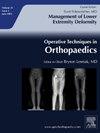Hyperglycemia in Orthopaedic Trauma Patients: Implications, Management, and Future Directions
IF 0.3
Q4 ORTHOPEDICS
引用次数: 0
Abstract
Physiologic stress-induced hyperglycemia (SIH) significantly impacts patient outcomes in both nondiabetic and diabetic individuals following orthopaedic trauma. This review synthesizes current literature on SIH's effects, highlighting its association with increased surgical site infections (SSI), extended hospital stays, wound complications, nonunion, need for revision surgery, and mortality. Nondiabetic patients with SIH face worse outcomes compared to euglycemic patients, including a higher risk of deep infections and systemic complications. Diabetic patients experience exacerbated hyperglycemia during trauma, leading to poor wound healing and heightened infection risk. Effective glycemic control, through preoperative optimization, intraoperative monitoring, and postoperative management, is crucial for improving outcomes. Special considerations are discussed for the geriatric population, who are particularly vulnerable to SIH-induced morbidity and mortality. Future directions emphasize developing tailored glycemia management algorithms, utilizing continuous monitoring systems, and fostering multidisciplinary collaboration to optimize care for orthopaedic trauma patients.
骨科创伤患者的高血糖症:影响、管理和未来方向
生理应激诱导的高血糖(SIH)对骨科创伤后的非糖尿病和糖尿病患者的预后都有很大影响。这篇综述综述了目前有关 SIH 影响的文献,强调了 SIH 与手术部位感染(SSI)增加、住院时间延长、伤口并发症、不愈合、翻修手术需求和死亡率的关系。与优血糖患者相比,非糖尿病 SIH 患者的预后更差,包括深部感染和全身并发症的风险更高。糖尿病患者在创伤期间会出现加剧的高血糖,导致伤口愈合不良和感染风险增加。通过术前优化、术中监测和术后管理来有效控制血糖对改善预后至关重要。本文讨论了老年人群的特别注意事项,因为他们特别容易受到 SIH 引起的发病率和死亡率的影响。未来的发展方向强调开发量身定制的血糖管理算法、利用连续监测系统以及促进多学科合作,以优化创伤骨科患者的护理。
本文章由计算机程序翻译,如有差异,请以英文原文为准。
求助全文
约1分钟内获得全文
求助全文
来源期刊

Operative Techniques in Orthopaedics
ORTHOPEDICS-
CiteScore
0.40
自引率
0.00%
发文量
40
审稿时长
83 days
期刊介绍:
Operative Techniques in Orthopaedics is an innovative, richly illustrated resource that keeps practitioners informed of significant advances in all areas of surgical management. Each issue of this atlas-style journal explores a single topic, often offering alternate approaches to the same procedure. Its current, definitive information keeps readers in the forefront of their specialty.
 求助内容:
求助内容: 应助结果提醒方式:
应助结果提醒方式:


